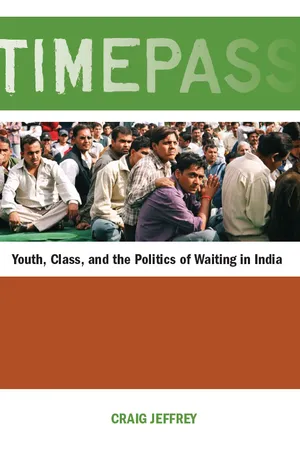
- 232 pages
- English
- PDF
- Available on iOS & Android
About this book
Social and economic changes around the globe have propelled increasing numbers of people into situations of chronic waiting, where promised access to political freedoms, social goods, or economic resources is delayed, often indefinitely. But there have been few efforts to reflect on the significance of "waiting" in the contemporary world.
Timepass fills this gap by offering a captivating ethnography of the student politics and youth activism that lower middle class young men in India have undertaken in response to pervasive underemployment. It highlights the importance of waiting as a social experience and basis for political mobilization, the micro-politics of class power in north India, and the socio-economic strategies of lower middle classes. The book also explores how this north Indian story relates to practices of waiting occurring in multiple other contexts, making the book of interest to scholars and students of globalization, youth studies, and class across the social sciences.
Frequently asked questions
- Essential is ideal for learners and professionals who enjoy exploring a wide range of subjects. Access the Essential Library with 800,000+ trusted titles and best-sellers across business, personal growth, and the humanities. Includes unlimited reading time and Standard Read Aloud voice.
- Complete: Perfect for advanced learners and researchers needing full, unrestricted access. Unlock 1.4M+ books across hundreds of subjects, including academic and specialized titles. The Complete Plan also includes advanced features like Premium Read Aloud and Research Assistant.
Please note we cannot support devices running on iOS 13 and Android 7 or earlier. Learn more about using the app.
Information
Table of contents
- Contents
- Acknowledgments
- 1. India Waiting
- 2. Cultivating Fields: The Rise and Resilience of a Rural Middle Class
- 3. Life at the Crossroads: Timepass
- 4. Collective Student Protest
- 5. Fixing Futures: Improvised Politics
- 6. Conclusions
- Bibliography
- Index